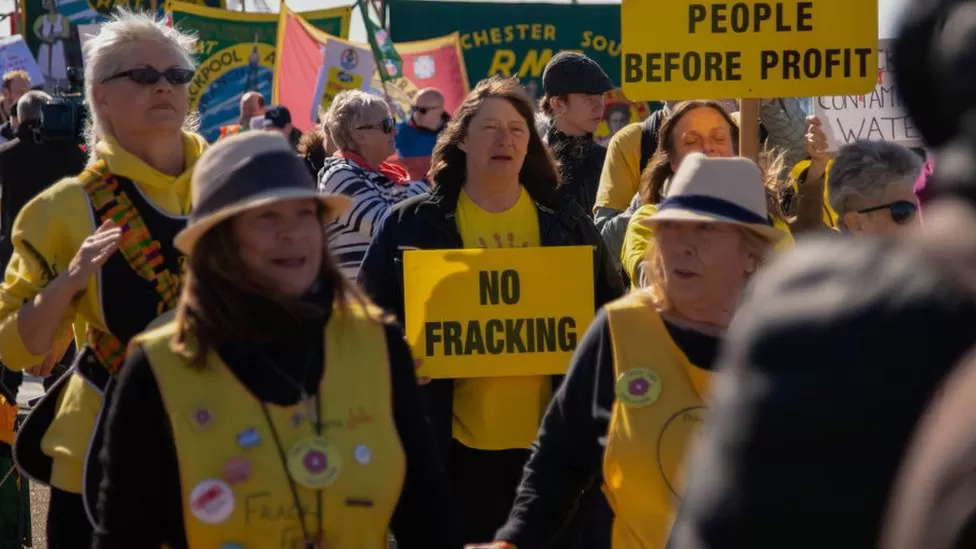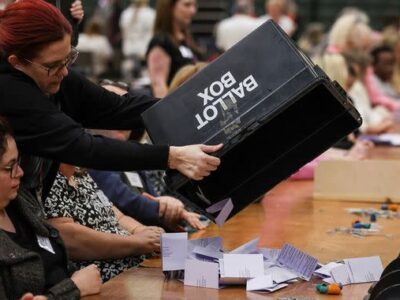The ban on shale gas fracking in England has been restored by new Prime Minister Rishi Sunak in his first PMQs. His predecessor Liz Truss had lifted the ban on the controversial process where there was local consent. In his first full day in the job, Mr Sunak also defended reappointing Suella Braverman as home secretary just days after she quit over data breaches. During Prime Minister’s Questions he would not commit to increasing benefits in line with prices. However, Mr Sunak said he would continue to “protect the most vulnerable”. His spokesman also refused to comment on whether the state pension would rise with inflation ahead of a statement by the chancellor next month. Jeremy Hunt is now due to set out the government’s plans for tax and spending on 17 November, after delaying the announcement by more than two weeks. Fact-checking Rishi Sunak’s first PMQs Who is in Rishi Sunak’s cabinet?

Ms Truss announced her decision to lift the ban on fracking, which involves drilling into the earth to recover gas from shale rock, in September. With energy bills rising, she argued fracking could boost the UK’s gas supplies. But the move provoked a backlash from many Conservative MPs because of concerns about earth tremors linked to fracking. The controversial process was halted in 2019 following opposition from environmental groups and local communities. Labor and other opposition parties are also against the return of fracking. Asked by Green MP Caroline Lucas if he would restore the moratorium on fracking pledged in the Conservatives’ 2019 manifesto, Mr Sunak said: “I have already said I stand by the manifesto on that.” The Tories’ general election manifesto said the party would not support fracking unless the science showed “categorically” that it could be carried out safely. The PM’s official spokesman later confirmed Mr Sunak was committed to this promise.
The last few weeks saw the near-total junking of Liz Truss’s programmed for government. Today at Rishi Sunak’s first PMQs, it felt like the last remaining remnants of her ideas were lobbed in the skip. So her flirtation with fracking in England is junked, with the PM restoring a 2019 “moratorium” on drilling for shale gas. It was also strongly hinted that the government will raise those benefits that don’t automatically go up with prices in line with the rate of inflation. Liz Truss was tempted to put them up in line with average earnings instead. So what about pensions? Will they go up in line with spiraling prices too? The prime minister’s official spokesman was less categorical about that, but the importance of the manifesto was repeatedly referenced.
Mr Sunak has previously expressed support for fracking. Just a week ago he voted against a Labor motion to ban the practice. Asked during a Tory leadership debate with Ms Truss in July whether he would support fracking, he replied: “Yes, if local communities support it.” Labor’s shadow climate and net zero secretary Ed Miliband said: “Whatever their latest position, the truth is that the Tories have shown that they cannot be trusted on the issue of fracking. The only way to guarantee that fracking will be banned for good is to elect a Labor government.” The move was welcomed by environmental groups, with Friends of the Earth describing it as a “fantastic victory for common sense”. Sam Hall, director of the Conservative Environment Network, said: “[Fracking] is unpopular, and few communities would approve fracking projects locally, meaning little or no gas would be extracted, despite the high political cost. “Instead, the government should focus on building more cheap and popular renewables, including onshore wind and solar where there is local support.”

Chaos surrounding a vote on fracking, brought by Labor last week, contributed to Ms Truss’s swift downfall, just 44 days after she took office. The evening before her resignation, there were accusations of Tory MPs being bullied and manhandled during the vote. Ministers denied physical force had been used to persuade colleagues to vote with the government. The government ultimately won the vote with a majority of 96, but 40 Tories did not take part. The Scottish and Welsh governments continue to oppose fracking, and say they will not use their powers to grant drilling license’s. In the past consent to begin fracking has been given only for two sites in Lancashire, neither of which are now in operation.
![]()





